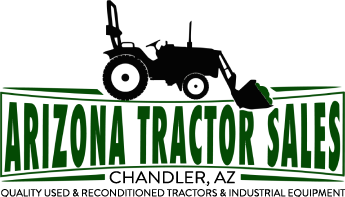Choosing the Right Tractor Tires
 A tractor is a powerful, versatile, and reliable machine that’s useful to have on any work site. Whether you use it for landscaping, lawn maintenance, or tilling the soil on your farm, tractors can get the job done quickly and easily. With this versatility also comes the potential for using specialized components that can further boost the power and efficiency of these workhorses. One such essential part is your tractor’s tires. With the right set of tires, you can maximize uptime and productivity in the fields.
A tractor is a powerful, versatile, and reliable machine that’s useful to have on any work site. Whether you use it for landscaping, lawn maintenance, or tilling the soil on your farm, tractors can get the job done quickly and easily. With this versatility also comes the potential for using specialized components that can further boost the power and efficiency of these workhorses. One such essential part is your tractor’s tires. With the right set of tires, you can maximize uptime and productivity in the fields.
Alaska Tire Service is proud to be your local tractor dealer serving Chandler, Arizona. We’ve put together this short guide to help you choose the best tractor tires for your needs. If you’re interested in exploring our stock of tractors for sale, check out our online selection or give us a call to learn about the machines we offer.
Types of Tractor Tires
The most important consideration you’ll need to make is the type of tractor tires you need. There’re plenty of options that are based on how the tire performs in various situations. R-1, or agriculture tires, are the standard choice for dryland farming. These are designed to have a strong grip on dry land using traction-grabbing lugs that run at deep angles.
R-2 tires work best on wet turf. They are made with increased tread depth, which makes it easier to travel on slippery surfaces. These tend to be used in areas full of moisture, such as on land used for rice paddy farming.
R-3 tires, also known as turf tires, are an all-purpose option. They can provide a good amount of traction over loose terrains, like sand and gravel. They also give you more surface area to work with so there’s less slipping.
R-4 tires are perfect for industrial projects. They provide exceptional traction due to their interwoven tread and lug design, which results in a reduced impact on the ground they traverse. These tires may be too big for some tractor models.
Front vs Back Tractor Tires
Some tractors work well when the front and back tires are of different types. Make sure to pick front tires that are specifically ribbed to provide a better grip. Single-rib options, also called F-1, result in improved steering control and deeper penetration into the ground. Three-ribbed options, also called F-2, offer improved control with reduced lateral side-slip from the raised center rib. F-2M tires come with four ribs and are great for tractors that transport heavy loads on hard surfaces.
Bias-Ply vs Radial
As you shop for tractor tires, you'll need to decide whether you want bias-ply or radial tires. The bias-ply options are built with sturdy sidewalls and are less prone to damage, making them cheaper to maintain and replace.
The radial options result in a smoother ride and less impact on the soil. They also run at a lower pressure more effectively, which can cut your tractor fuel costs.
The Load Rating
Another key aspect to consider is the load rating, which is indicated by stars that correlate to the maximum tire pressure in PSI. One star means a maximum of 18 psi, two stars mean a maximum of 24 psi, and three stars mean a maximum of 30 psi. Keep in mind that tractor tires can’t operate well when they are overloaded. You can use these psi numbers and the tire size to figure out the right load rating for your tires.
We hope this guide to choosing the right tractor tires has been helpful. When you’re ready to upgrade your tires or check out our selection of tractors for sale, get in touch with our friendly staff. We offer easy financing options to help you get the equipment you need. Arizona Tractor Sales proudly serves customers from the western United States.

